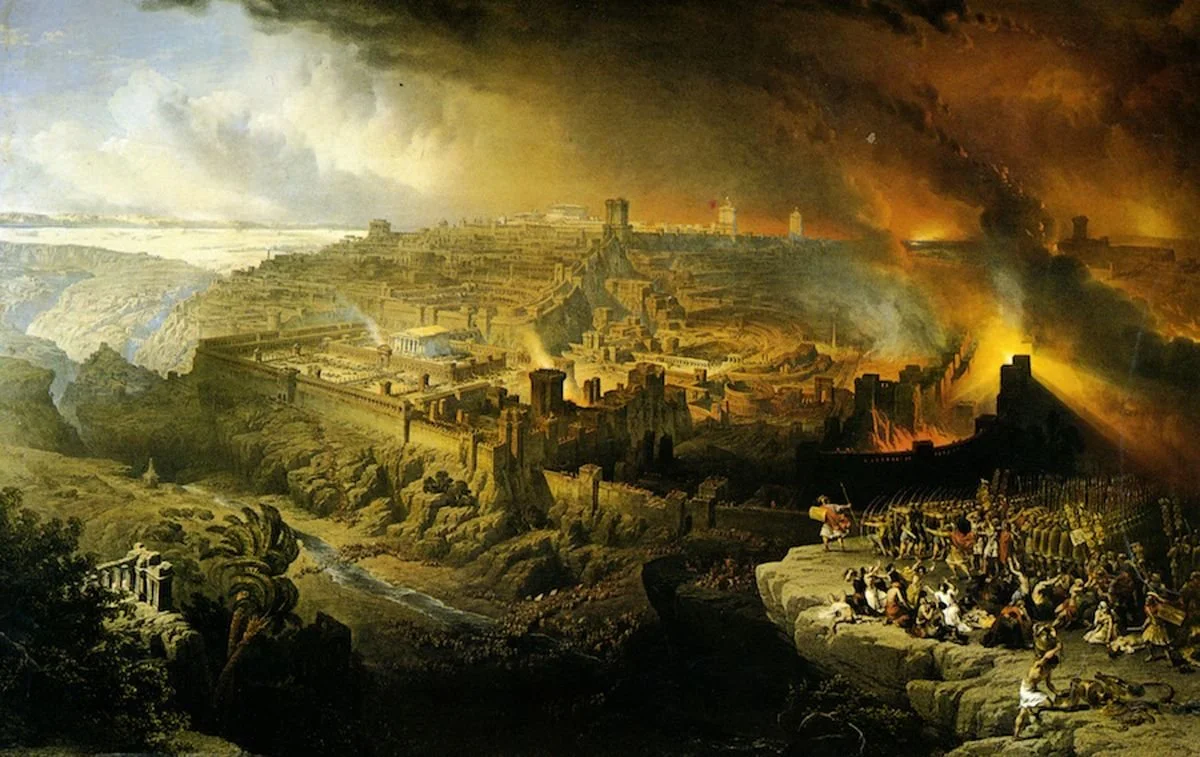Why The Existential Battle For Israel Is Not An Existential Battle For Israel
Israel was set to have 2023 be its biggest tourism year since it became a nation again in 1948. More than 9 million people were going to make the holy pilgrimage this year, nearing the actual population of those living in the land, including the 35 souls set to leave on our trip the day after the October 7 attacks. Now in the grip of what feels like a battle for its existence, many of us who regularly travel to Israel wonder when we will be back next.
If one thing is for sure, Israel has been here before, and she will be here again.
Egypt: The Impossible Pathway
Imagine standing on the shores of an immense sea, the water stretching out before you, endless and vast. Behind you, an advancing army, thundering in its approach. This is not a scene from a blockbuster film, but an episode from the history of Israel. When the Israelites found themselves trapped between Pharaoh’s army and the Red Sea, many might have given up hope. But for Israel, such challenging moments have become touch points of divine intervention and assurance.
The narrative of Israel's slavery in Egypt is heart-wrenching. For 400 long years, the children of Israel endured brutal servitude and cruel masters. They cried out, waiting for relief, hoping for an end to their suffering. It was a period that could have easily led to a loss of faith and hope, yet the Israelites clung to the words of Joseph that there would be a deliverer. God, in His perfect timing, rose in defense of His oppressed people.
The psalmist reminisces, "When the waters saw you, O God, when the waters saw you, they were afraid; indeed, the deep trembled. The clouds poured out water; the skies gave forth thunder; your arrows flashed on every side. The crash of your thunder was in the whirlwind; your lightnings lighted up the world; the earth trembled and shook. Your way was through the sea, your path through the great waters; yet your footprints were unseen. You led your people like a flock by the hand of Moses and Aaron." (Psalm 77:16-20, ESV).
The Red Sea event wasn't just a miraculous rescue; it was a divine affirmation that even after centuries of silence, God hadn't forgotten His covenant. It was a sign that when barriers seem insurmountable and when hope is almost extinguished, God creates pathways where none previously existed.
Haman’s Plot: The Shadow of Annihilation
In the Persian Empire, the Jews faced an enemy named Haman, who harbored an intense hatred for them. His plotted genocide loomed large, promising a grim fate for every Jew. Mordecai and Esther, placed in the royal court by divine providence, risked everything. Through fasting, prayer, and Esther's courage, God's deliverance came in an unexpected turn of events, turning the tables on Haman and ensuring the survival of the Jewish people.
Babylonian Exile: The Temple in Ruins
The Babylonians, under King Nebuchadnezzar, besieged Jerusalem, laying waste to the city and the Holy Temple. The heart of Jewish worship was in ruins, and the people were taken captive to foreign lands. In the face of utter desolation, the divine promise rang true. Prophets like Jeremiah and Ezekiel reminded the people of God's faithfulness. Their eventual return and rebuilding of the Temple became symbolic of God’s unyielding commitment to His people.
Rome: A Name Erased, But Not Forgotten
The Romans, powerful and vast in their reach, imposed their rule on the Jewish homeland. With the destruction of the Second Temple in 70 AD and the aftermath of the Bar Kokhba revolt in 135 AD, the Jewish identity faced deliberate erasure. The renaming of their land to "Palestina" aimed to bury our heritage. But even in diaspora, the Jewish spirit remained unbroken. Out traditions, faith, and hope in God's promises kept identity alive, awaiting a homeland that one day would reclaimed.
2,000 Years of Persecution: Hatred Without Boundaries
Throughout the ensuing centuries, the Jewish diaspora faced persecution in nearly every corner of the world. The Spanish Inquisition sought to forcibly convert or expel them. The pogroms in Russia unleashed waves of violence, causing pain and displacement. Europe, a continent called home for centuries, became the stage for the Holocaust, an unprecedented genocide aiming to wipe out every Jewish soul.
And yet, against all odds, our people have endured. The embers of faith and identity, far from being extinguished, burned even brighter.
1948: Independence and Immediate Assault
In 1948, a declaration rang out that felt like the culmination of centuries of hope and divine promises: Israel was reborn as a sovereign state.
But even in this moment of profound significance, the shadows of adversity didn't delay. The very next day, neighboring nations launched a concerted attack, intent on snuffing out the newly born nation. The odds were heavily stacked against Israel, a fledgling state, outnumbered and out-armed.
Yet, as had been the story throughout our history, the miraculous unfolded. Despite the formidable forces against them, Israel not only survived, but emerged victorious.
This event, like so many others in their history, signified that the spirit of the Jewish people and the protective hand of God remained unwavering. The rebirth of Israel wasn't merely a political milestone; it was a testament to a people whose existence, against all human reasoning, continues to defy the odds.
The Uniqueness of Jewish Survival
The saga of Jewish resilience and survival is unparalleled in history. No other people group has faced such consistent, intense, and varied threats to their existence. Even for those who may not be of faith, the objective lens of history showcases a pattern too prominent to ignore:
The Jewish people's enduring spirit, despite relentless adversities, stands as a testament to a divine narrative playing out across the millennia.
The persistent and particular hatred aimed at them demands reflection, raising the question: Why such specific animosity?
While complex, the answer certainly points to a divine orchestration and purpose beyond human comprehension.
At every significant juncture in history, when Israel's existence was threatened, a pattern emerged - a miraculous escape or divine intervention. And despite being surrounded by hostile neighbors, then and now, Israel has survived.
Why?
Because Israel's story isn't just about a land or a people, it's deeply rooted in God's divine promise.
A Unique Strain of Animosity
Today, the global climate feels tenser than ever. The fire of animosity and geopolitical tensions has been lit once again, and the Middle East is boiling.
Daily headlines shout stories from Gaza, the West Bank, Lebanon, Syria, Iraq, and Iran. Nations like Russia, Ukraine, and China are also making their strategic moves, each with its agenda.
And amidst all these colossal players, the United States, often seen as a global peacekeeper, finds itself entangled in the intricate web of international politics.
In this ever-evolving global chessboard, Israel stands out not for its size, but for its significance. This tiny nation, comparable in size to New Jersey, remains at the epicenter of global attention. The growing calls for its destruction are deafening.
Israel once again finds herself surrounded by enemies, with her back against the vast expanse of the Mediterranean Sea. It's an all-too-familiar position, and for many, it feels like the perfect moment for a divine intervention.
Yet, the scriptures speak of even more looming challenges on the horizon for Israel. The prophet Zechariah, in chapter 14, gives a chilling forecast: “a time is coming when all nations will gather against Jerusalem.”
This prophecy serves as a stark reminder that the battle for Israel's existence is not just a historical or present-day challenge, but also a future one.
Through the pages of history, no nation or people group has experienced the kind of existential threats and diversity of hatred that the Jewish people have. Jewish identity has been under relentless assault - from the beginning.
And yet, time and time again, we have not just survived, but thrived. This unprecedented history of survival isn't just unique - you might even say it's supernatural. The sheer scale and intensity of animosity directed towards the Jews, spanning different cultures, continents, and centuries, makes ongoing existence nothing short of miraculous.
The Unbreakable Bond: Israel, Jesus, and You
Often, in the panorama of faith that spans the globe, a crucial thread is overlooked: the profound Jewishness of Jesus of Nazareth. The Messiah, the Anointed One promised in the scriptures, was explicitly prophesied to emerge from the tribe of Judah. From the lineage of King David, the shepherd boy turned king, arose this figure who would forever reshape history.
Jesus was not just influenced by Jewish culture; He was intrinsically Jewish. He was born a Jew, was raised attending the synagogue, and taught passionately from the Torah. Every Sabbath, every festival, every tradition He observed was steeped in the rich heritage of Israel.
There's a common misconception, however, especially among many in the Christian world:
Many believe Jesus was born a Jew, became a Christian, and left His heritage behind.
As a Messianic Jew today, I often face a particular question: "When did you convert?" What they're really asking, perhaps without realizing it, is: "When did you stop being Jewish, put your faith in Jesus, and become a Christian?"
The truth is, I never stopped being Jewish.
Had Jesus been born into any other lineage and not been Jewish, He wouldn't have been the Messiah. His identity, mission, and sacrifice were intricately tied to His Jewishness.
Yet, many followers of Christ often forget His Jewish heritage and origins. They disconnect the Christ they worship from the Jewish world in which He lived and breathed.
Simultaneously, many Jews, awaiting the appearance of a triumphant, kingly Messiah, did not recognize Him in His first coming. They were waiting for the Lion of Judah, the Conquering King, not realizing that before His majestic return, He would first come as the suffering servant described in Isaiah 53 - the Lamb of God who takes away the sins of the world.
For Christians, this is a pivotal point of reflection:
Your entire spiritual conviction, your hopes for eternity, all rest on the shoulders of a Jewish techton from Nazareth.
It might be an unsettling realization for many believers that when they find themselves face to face with the King of kings and Lord of lords in eternity, they will worship a Jewish Jesus. And, just as a reminder, that New Jerusalem we've heard so much about? It's not in the Hamptons. It's a reclamation of the kingdom right here on earth, on Zion, His holy mountain.
Awakening The Church
In our day, there exists a dangerous doctrine that's crept into the theological framework of many within the Church. It's known as supersessionism or replacement theology. At its core, this doctrine posits that the Church has replaced Israel in the heart of God. This belief insinuates that Israel, once the chosen people, has been set aside, and that all the promises of God have now been transferred to the Church.
Yet, this line of thinking stands in stark contrast to the passionate words of the Apostle Paul in his epistle to the Romans. When addressing the question of whether God had rejected His people, Paul responded with an emphatic, "May it never be!" (Romans 11:1).
Throughout the eleventh chapter of Romans, Paul speaks with urgency, hoping to shake the Gentile believers from any arrogance or complacency they might harbor regarding their spiritual position. He paints a vivid picture of the intertwined destinies of the Jewish people and the Gentile Church.
Like the grafting of wild olive branches into a cultivated olive tree, Gentile believers have been grafted into the rich heritage of the Jewish faith (Romans 11:17-18). But this grafting doesn't mean the natural branches - Israel - are discarded or forgotten.
It's imperative for the Church to recognize the weight of what Paul is communicating. To deny Israel's continued place in the heart of God is to misinterpret Scripture and miss out on the depth of God's redemptive plan for all humanity.
There's a stirring, a spiritual rumbling, beckoning the Church to wake up and recognize its roots. It's time for an awakening. For clarity. For a return to a true understanding of the grand narrative in which both Jew and Gentile play vital roles.
We must remember: if God is unfaithful to Israel, what assurance does the Church have of His faithfulness?
Thankfully, God's nature is unchanging, and His promises remain. In the final act, it won't be God and the Church or God and Israel, but rather, God with all His people, united in purpose and heart. But make no mistake, Israel will be there.
Why The Existential Battle For Israel Is Not An Existential Battle For Israel
While much of the world watches in shock and horror, it seems like Israel is grappling for its existence. The scenes on our screens and the clamor of voices on our streets resonate with pain, distress, and confusion. The reality of seeing Israel battle this existential threat is heart-wrenching. Especially when witnessing firsthand the rallying cries for its annihilation on streets far removed from the conflict itself.
The trauma of the events on both sides of the Gaza border isn't lost on anyone paying attention. Living under the shadow of such conflict isn't just about physical survival, it's about psychological endurance.
Imagine the generational trauma that children on both sides undergo. They are born into a world of division and grow up witnessing hatred, violence, and tragedy. Kids are growing up without parents, learning about the world through the lens of trauma and pain.
In Israeli cities, even the daily, mundane sounds have been impacted: ambulance companies in Israel have changed the sound of their sirens so that they aren't mistaken for rocket alerts. The emotional toll of living with such pervasive stress and fear is profound.
I read a story about a man in England walking on the streets of London in the evening of October 7. It encapsulates the complexity of the situation. As Hamas crossed into southern Israel, resulting in atrocities against Jewish Israelis, Arab Israelis, Americans, French, and other nationalities, this man hoped to find solace and mourning in front of the Israeli embassy in London. Instead, he witnessed a completely different scene, with chants suggesting the removal of Israel altogether. “From the river to the sea, Palestine will be free!” You can see the scene he witnessed in this video here.
But what about the Jewish people? Aren’t the Jews entitled to agency and self-determination in their ancient homeland?
As we take in these sobering truths, let's not forget our foundational belief: Though the battle feels existential, Israel will stand. Throughout history, Israel has faced immense adversity and, against all odds, has persisted.
In contemplating the position of Israel in the world today, two contrasting images emerge: its vulnerability among nations and its security in God's embrace.
At its core, the existential battle Israel faces is deeply spiritual, a cosmic duel that transcends the physical realm. It's this very spiritual struggle that determines the tangible fate of the nation. And amidst the echoing cries and turbulent politics, we are reminded of God's enduring covenant promises. These promises, sealed in antiquity, ensure that even in its most vulnerable moments, Israel remains secure in the steadfast love of God.
The Jewish Road has always been about narrating the comprehensive story of faith. It's about recounting the entire story of God and His chosen people. Today, this story has an added layer. The narrative now encompasses modern Israel, once again surrounded by adversaries, a continuation of an ancient tale.
As we journey together on this road, our responsibility remains to articulate this story in its fullness, understanding its past, present, and certain future.
About The Jewish Road
At the heart of The Jewish Road lies a passion ignited by a father-son duo, Ron and Matt Davis. Our journey began with a simple yet profound desire: to bridge the gap in understanding that has kept two faith communities apart for too long. We're here to help Christians connect with the roots of their faith and for Jews to explore the life and teachings of Jesus with an open heart.
Imagine a world where every believer, be it Jewish or Christian, not only knows their faith but truly understands its origins and interconnectedness. We strive to restore the Jewish essence of the Gospel, offering insights that deepen knowledge, bolster faith, and propel the growth of the Kingdom. The narrative of faith, we believe, is a two-act play where both acts are essential for a comprehensive grasp of the story. By uniting these acts, we're presenting a more holistic and enriching perspective.
Life is too short to wander without knowing the full essence of your beliefs. Whether you're attending a synagogue or a church, there's so much more to discover. The Jewish Road is here to guide, enlighten, and, most importantly, bring both halves of the story together. Join us on this journey; together




